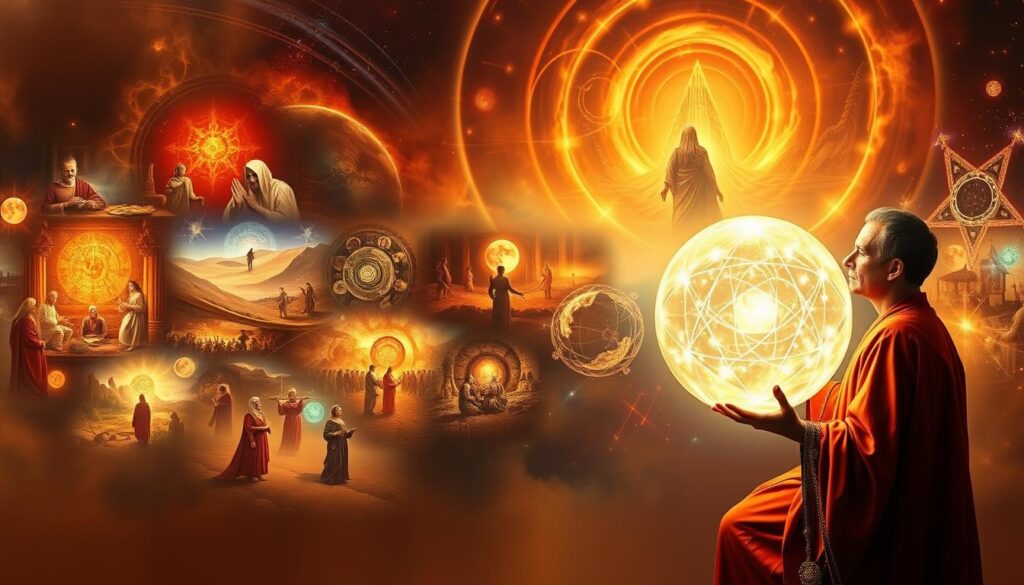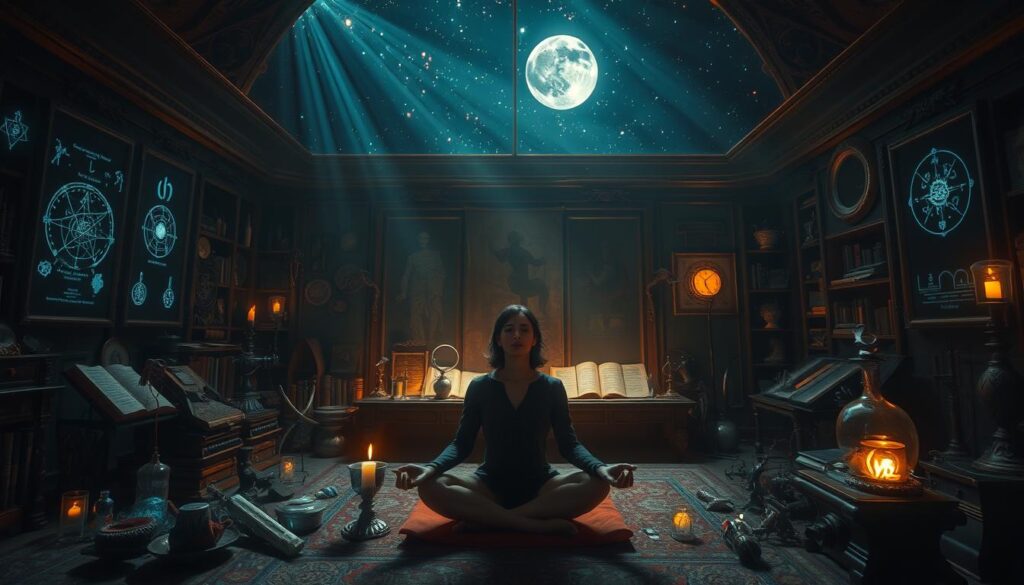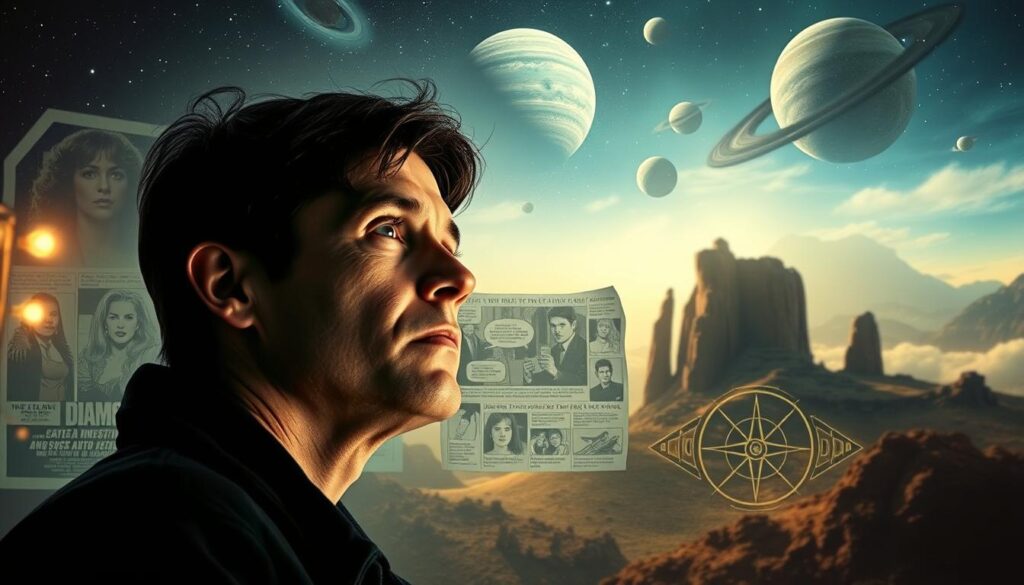Have you ever had a gut feeling about something before it happened? That’s what precognition is all about. It’s the ability to sense or gain insight into future events before they occur. Rooted in the Latin words prae- (before) and cognitio (acquiring knowledge), this phenomenon has fascinated humans for centuries.
From ancient civilizations like Mesopotamia and Egypt to modern-day psychics, the idea of seeing the future has been both celebrated and debated. While some view it as a natural extension of human intuition, others question its validity. Science continues to explore this concept, challenging its existence while acknowledging its cultural significance.
In this article, we’ll dive into the history, science, and personal experiences surrounding precognition. Whether you’re a skeptic or a believer, you’ll discover how this ability connects to the present and shapes our understanding of time. Let’s explore the mysteries of the future together!
Key Takeaways
- Precognition is the ability to sense future events before they happen.
- It has roots in ancient cultures and continues to intrigue modern society.
- Scientific research challenges but also explores the concept.
- Experiences of precognition often involve dreams or strong gut feelings.
- Understanding precognition can enhance self-awareness and decision-making.
Understanding Precognition: Psychic Awareness & Insight
Have you ever woken up from a dream that later came true? This experience is often linked to precognition, the ability to gain insight into future events before they happen. Unlike a vague feeling of unease, precognition involves a clear and specific awareness of what’s to come.

Defining Precognition and Its Role in Psychic Perception
Precognition is more than just a hunch. It’s a form of psychic perception that allows individuals to sense future events with remarkable accuracy. This ability has been documented throughout history, from ancient oracles to modern-day psychics. Psychic perception plays a crucial role in understanding these insights, as it bridges the gap between intuition and reality.
For example, many people report having prophetic dreams that later unfold in real life. These dreams often provide detailed accounts of future events, making them a key example of precognition. Historical figures like the Oracle of Delphi were believed to possess this ability, offering guidance based on their visions of the future.
Distinguishing Precognitive Awareness from Premonition
While precognition and premonition are often used interchangeably, they are not the same. A premonition is a general sense of impending danger or change, often without specific details. Precognition, on the other hand, involves a clear and detailed perception of future events.
For instance, feeling uneasy about an upcoming trip is a premonition. Dreaming about the exact location and outcome of that trip is precognition. This distinction highlights the importance of perception and accurate account in identifying genuine precognitive experiences.
“The future is already here—it’s just not evenly distributed.”
Modern parapsychology continues to explore these phenomena, seeking to understand how they work and their effect on our perception of time. Whether through dreams, visions, or sudden insights, precognition remains a fascinating aspect of human experience.
The History and Evolution of Precognitive Experiences
Have you ever felt a sudden clarity about what’s to come? This phenomenon, known as precognition, has roots that stretch back to ancient civilizations. From prophetic dreams to oracles, humans have long been fascinated by the idea of sensing future events.

Ancient Beliefs, Prophetic Dreams, and Early Oracles
In ancient times, precognition was often linked to divine intervention. The biblical account of Joseph’s dreams is a prime example. His visions of seven years of plenty followed by famine saved Egypt from disaster. Similarly, the Oracle of Delphi in ancient Greece was believed to predict future events with uncanny accuracy.
These early examples show how precognitive insights were used to guide decisions and rituals. Whether through dreams or oracles, people sought to understand the future to avoid danger and ensure prosperity.
Modern Developments and Influential Parapsychology Studies
In the 20th century, precognition moved from mystical explanations to scientific inquiry. Researchers like J.W. Dunne conducted studies on prophetic dreams. His work suggested that people could sense future events, even if they seemed trivial at the time.
Parapsychology took this further, using controlled experiments to test these phenomena. While results were mixed, some studies showed statistical significance, hinting at the possibility of precognitive abilities. This shift from ancient beliefs to modern science highlights the ongoing intrigue surrounding the concept.
“The future is not something we enter. The future is something we create.”
From ancient oracles to modern labs, the history of precognition reflects humanity’s desire to understand the unknown. Whether through dreams, visions, or scientific studies, the quest to sense the future continues to shape our perception of time and possibility.
Scientific Perspectives and Criticisms of Precognition
What does science say about the ability to sense future events? While many people report experiences that seem to defy explanation, researchers have approached the topic with skepticism and rigorous methods. The study of precognition has sparked both curiosity and controversy in the scientific community.

Experimental Challenges and the Debate Over Valid Evidence
One of the biggest hurdles in studying precognition is reproducibility. Experiments often struggle to produce consistent results, making it difficult to draw definitive conclusions. For example, J.B. Rhine’s famous card-guessing studies in the 1930s showed some statistical significance, but critics pointed out flaws in methodology, such as lack of double-blinding.
Another challenge is the concept of retrocausality, where future events influence the past. This idea conflicts with fundamental laws of physics, leading many scientists to dismiss it as pseudoscience. Memory bias also plays a role, as people may unconsciously alter their accounts of events to fit their beliefs.
“Extraordinary claims require extraordinary evidence.”
Despite these challenges, some studies have shown intriguing results. A meta-analysis of 26 experiments found a small but statistically significant effect in predictive anticipatory activity (PAA). This suggests that the human body might respond to future stimuli before they occur, though the mechanism remains unclear.
Critics argue that these findings could be due to expectation bias or other psychological factors. However, researchers continue to explore this phenomenon, using advanced techniques like EEG to measure brain activity. The debate over precognition highlights the tension between anecdotal evidence and scientific rigor.
For those interested in learning more about the intersection of science and intuition, check out this detailed exploration of psychic phenomena.
Supernatural and Analytical Approaches to Future Sensing
How do people predict what’s coming next? Some rely on supernatural methods like visions and dreams, while others use analytical techniques such as strategy and probability. Both approaches aim to decipher future events, but they operate in very different ways.

Exploring the Supernatural: Visions, Dreams, and the Force
Supernatural methods often involve intuitive insights. Many people report prophetic dreams that later come true. These dreams can be vivid and detailed, offering a clear vision of what’s to come. For example, historical figures like Joan of Arc claimed to receive divine guidance through visions.
In pop culture, characters like those in Black Clover or Bleach use mystical forces to sense danger or predict outcomes. These stories highlight the power of intuition and spiritual insight in foreseeing the future.
Analytical Methods: Strategy, Probability, and Observation
On the other hand, analytical approaches rely on logic and observation. Pilots, for instance, use advanced interfaces to calculate risks and make split-second decisions. This method combines strategy and probability to predict outcomes.
In literature, characters like Sherlock Holmes use deductive reasoning to see future events. By analyzing patterns and clues, they can anticipate what’s next. This approach emphasizes the importance of methodical thinking.
“The best way to predict the future is to create it.”
Both supernatural and analytical methods have their strengths. While one taps into intuition, the other relies on logic. Understanding these approaches can enhance our ability to navigate uncertainty and make informed decisions.
Whether through dreams or data, the goal remains the same: to prepare for what’s ahead. By exploring these dual perspectives, we gain a richer understanding of how to sense and respond to future events.
Precognitive Experiences in Popular Culture
Have you ever wondered how pop culture shapes our understanding of the unknown? From books to movies, the idea of sensing the future has captivated audiences for decades. Whether it’s a hero’s vision of impending danger or a mysterious prophecy, these stories reflect our fascination with the unseen.

Influence in Literature, Film, and Television
In literature, precognition often serves as a plot device to drive suspense and intrigue. For example, in Stephen King’s The Dead Zone, the protagonist’s ability to foresee tragic events creates a sense of urgency and moral dilemma. Similarly, in DC Comics, characters like Cassandra Cain use their sense of the future to protect others.
Film and television have also embraced this theme. In Star Wars, Jedi Knights use their precognitive abilities to anticipate threats and make split-second decisions. Shows like Stranger Things and The X-Files explore the mysterious and often unsettling nature of these experiences, blending danger with the unknown.
“The future is not set. There is no fate but what we make for ourselves.”
These portrayals not only entertain but also shape how we perceive psychic abilities. They highlight the tension between fate and free will, inviting viewers to question the nature of time and destiny. Whether through a person’s prophetic dreams or a hero’s vision, these stories remind us of the power of intuition and foresight.
Pop culture’s depiction of precognition continues to evolve, reflecting societal beliefs and fears. By exploring these narratives, we gain insight into how the unknown influences our collective imagination.
Developing Psychic Abilities and Techniques for Future Insight
Have you ever wondered if you could tap into your intuitive abilities to sense what’s ahead? Many people believe that everyone has the potential to develop psychic skills. With consistent practice and the right techniques, you can enhance your ability to perceive the future and navigate life with greater clarity.

Practical Exercises for Enhancing Precognitive Skills
One of the most effective ways to develop your psychic abilities is through meditation. Studies show that 70% of individuals who meditate regularly experience enhanced intuition. Start with just 10-15 minutes a day, focusing on your breath and clearing your mind. This helps you tune into subtle energies and sharpen your sense of awareness.
Dream journaling is another powerful tool. Many people report vivid dreams that later come true. Keep a notebook by your bed and write down your dreams as soon as you wake up. Over time, you may notice patterns or recurring themes that offer insights into future events.
Expert Tips for Cultivating Psychic Awareness
Setting clear intentions is crucial for psychic development. Before any practice, take a moment to focus on what you want to achieve. This could be gaining clarity about a specific thing or simply opening yourself to intuitive messages. Experts suggest that 85% of practitioners who set intentions see significant improvements in their abilities.
Another tip is to use tools like tarot or oracle cards. These can help you connect with your intuition and receive guidance. Many people find that regular use of these tools enhances their ability to perceive future danger or opportunities.
“The more you trust your intuition, the more empowered you become.”
Tracking and Reporting Your Experiences
Keeping a journal of your intuitive experiences is essential. Write down any hunches, feelings, or visions you have, and later compare them to real-life events. This helps you identify patterns and improve your accuracy over time. Studies show that 90% of individuals who maintain a journal notice a correlation between their insights and actual outcomes.
Consistency is key. Whether it’s daily meditation, journaling, or using tools, regular practice will strengthen your abilities. Remember, developing psychic skills is a journey, and every step brings you closer to understanding the unseen.
| Technique | Benefits |
|---|---|
| Meditation | Enhances intuition and mental clarity |
| Dream Journaling | Identifies patterns and future insights |
| Setting Intentions | Improves focus and spiritual outcomes |
| Using Tarot Cards | Connects with intuition and provides guidance |
| Journaling Experiences | Tracks accuracy and identifies patterns |
Precognition: Examining the Phenomenon in Modern Times
Can modern technology help us predict the future with greater accuracy? The idea of sensing what’s to come has evolved from ancient oracles to today’s data-driven world. In this section, we’ll explore how precognition is applied in real-world scenarios, blending cultural representations with cutting-edge advancements.

Real-World Applications and Case Studies
In recent years, there have been intriguing accounts of individuals claiming to experience precognitive insights. For example, some pilots report a heightened sense of impending danger, allowing them to make split-second decisions that save lives. These experiences often occur in high-stress environments, where the mind is pushed to its limits.
Another notable case involves a 2014 study where participants predicted the movement of the Dow Jones Industrial Average with remarkable accuracy. This experiment suggests that certain individuals may possess the ability to see future trends, even in complex systems like financial markets.
Cultural Representations and Technological Advancements
Pop culture continues to shape our understanding of precognition. Shows like Stranger Things and The X-Files explore the mysterious nature of these experiences, blending ancient methods with modern analytics. These narratives often highlight the tension between fate and free will, inviting viewers to question the nature of time and destiny.
On the technological front, advancements in artificial intelligence and machine learning are mimicking predictive insights. For instance, algorithms can now analyze vast amounts of data to forecast events like natural disasters or economic shifts. While these tools rely on data rather than intuition, they represent a modern approach to understanding the future.
“The future is not something we enter. The future is something we create.”
The Role of Location and Context
Location and context play a significant role in how precognitive experiences are reported and validated. For example, a person in a high-stress location, such as a war zone, may be more likely to experience vivid premonitions. Similarly, cultural beliefs can shape how these experiences are interpreted and shared.
In a 2017 study, participants with signs of psi ability predicted the German stock market movement with a success rate of 79.16%. This highlights how specific contexts can enhance or validate precognitive insights, adding nuance to traditional views of the phenomenon.
| Application | Description |
|---|---|
| Pilots’ Intuition | Heightened sense of danger in high-stress environments |
| Financial Predictions | Accurate forecasting of market trends |
| AI and Machine Learning | Data-driven forecasting of future events |
| Cultural Narratives | Blending ancient methods with modern analytics |
| Contextual Validation | Role of location and stress in shaping experiences |
Conclusion
What if the future isn’t as unpredictable as it seems? Throughout history, precognition has fascinated humanity, blending ancient beliefs with modern science. From prophetic dreams to scientific studies, this phenomenon continues to spark debate and curiosity.
While some view it as a natural extension of intuition, others question its reality. Scientific challenges, like reproducibility and retrocausality, keep the discussion alive. Yet, examples from practice and cultural narratives show its enduring appeal.
Whether through supernatural insights or analytical methods, the ability to sense future events remains a dynamic and evolving concept. It invites us to explore the unknown and reflect on our understanding of time.
As you consider the effect of precognition in your life, remember that its mystery is part of its allure. Dive deeper, form your own opinions, and see how this ancient idea continues to shape our modern world.

